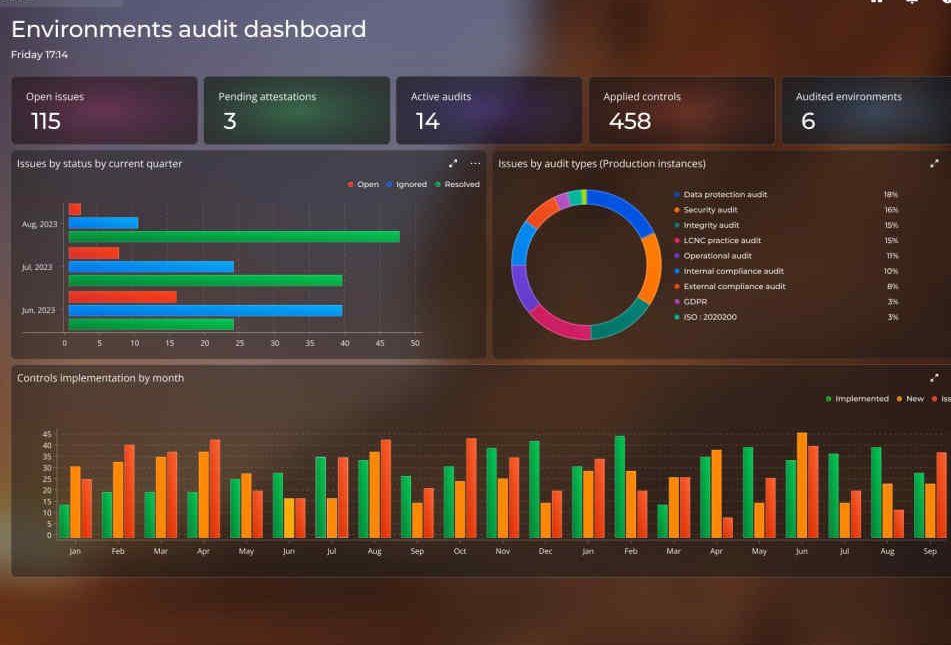 APPS
APPS
 APPS
APPS
 APPS
APPS
No-code platform developer Creatio Inc. said today it has completed the transition to a fully composable architecture it announced last December.
The company is also rolling out an overhauled user interface, adding generative artificial intelligence-powered recommendations for workflow design and automation and introducing governance features. Composable architecture is a building-block approach to application development that allows developers to select components and link them together. Creatio’s approach uses a four-tier topology made up of what it calls widgets, blocks, applications and automations.
Widgets are the smallest function that has a user interface attached to it, such as a next-best offer or a quick customer presentation. When combined, they create blocks blocks for a specific function such as a chat panel attached to an application. Those can be combined into applications for more ambitious use cases like case management or sales forecasting. Applications can be combined to automate functions with multiple use cases such as end-to-end service automation. Creatio said the elements can be used to assemble custom applications in minutes.
“All applications developed for different use cases are fully composable to the smallest granular level,” said Andie Dovgan, Creatio’s growth officer.
The new “Quantum” release includes more than 100 no-code components and blocks including next steps, timeline, approvals, communication panel, mini pages, editable lists, timers, messaging components, prompts, decision paths and mobile app components. The platform now encompasses “several hundred” components, Dovgan said.
The company has also built several ready-to-use applications into the platform such as Customer 360 to manage customer data and digital ads for consolidating and orchestrating digital campaigns. Other included applications are case management, lead management, knowledge management, order and contact management, productivity, engagement tools, email marketing and event marketing with more planned in the future, the company said.
The generative AI feature, which is based on OpenAI LLC’s ChatGPT large language model, can automatically pre-generate templates, components and even some applications based on natural language requests, Creatio said. Users can also add a feature to automatically generate human-like text responses or recommendations.
The generative AI service is provided through a private OpenAI account that gives users the choice of what data to share with the model. “We are also actively working on additional sources to make sure we’re not dependent on just one LLM,” Dovgan said.
The governance application (pictured) includes more than 100 built-in governance checks and controls for regulations such as the European Union’s General Data Protection Regulation and the Health Information Portability and Accountability Act. It encompasses security requirements, internal audits and many other compliance elements, Creatio said.
Users can set up an unlimited number of custom governance controls with no-code tools and the software allows them users to identify and escalate discovered issues, monitor application health status in real-time and conduct audits. They can also add their own controls based on internal requirements.
“We guide you in what checks to apply and you can also assign checks based on different teams, so a fusion team might have different checks than someone building a simple app,” Dovgan said. Governance controls are administered at a high level so that applications can’t be moved into production until checks are completed.
Support our open free content by sharing and engaging with our content and community.
Where Technology Leaders Connect, Share Intelligence & Create Opportunities
SiliconANGLE Media is a recognized leader in digital media innovation serving innovative audiences and brands, bringing together cutting-edge technology, influential content, strategic insights and real-time audience engagement. As the parent company of SiliconANGLE, theCUBE Network, theCUBE Research, CUBE365, theCUBE AI and theCUBE SuperStudios — such as those established in Silicon Valley and the New York Stock Exchange (NYSE) — SiliconANGLE Media operates at the intersection of media, technology, and AI. .
Founded by tech visionaries John Furrier and Dave Vellante, SiliconANGLE Media has built a powerful ecosystem of industry-leading digital media brands, with a reach of 15+ million elite tech professionals. The company’s new, proprietary theCUBE AI Video cloud is breaking ground in audience interaction, leveraging theCUBEai.com neural network to help technology companies make data-driven decisions and stay at the forefront of industry conversations.